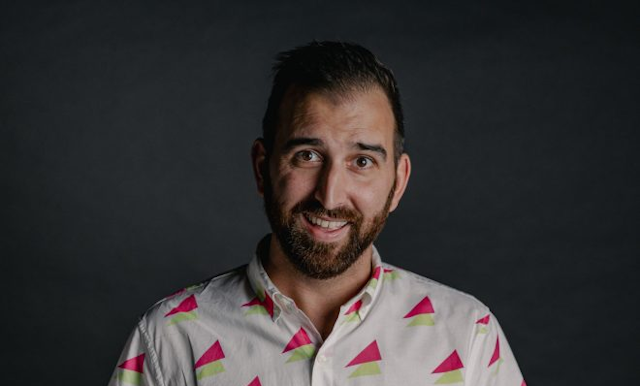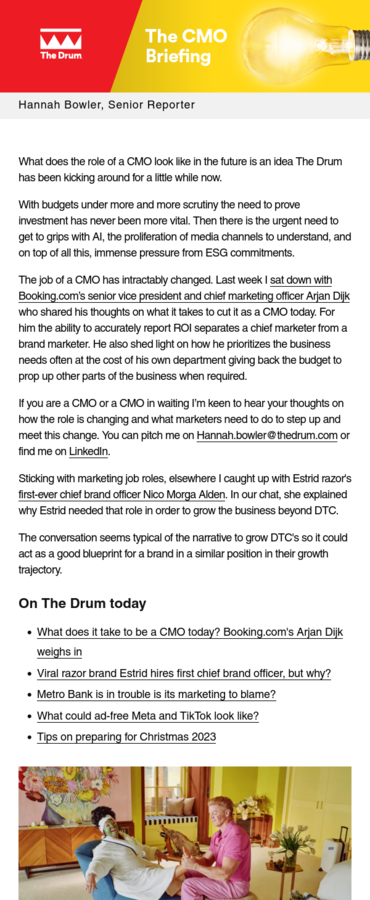Which ad agencies are advising clients to evacuate Twitter?
We hear from agency experts about the advice they’ve been offering to advertisers regarding Twitter.

With Twitter in crisis, what advice are agenices giving out to clients? / The Drum
After another week of abject chaos at one of the world’s largest social platforms, more advertisers have frozen their spend on Twitter. Over the weekend, Omnicom joined IPG in warnings clients off the stricken social network.
We’ve continued to survey industry experts to see what they’re telling their clients. Should brands stay or should they go?
Advertisement
How do you solve a problem like... brand presence on Twitter?

Kenny Gold, managing director, head of social, content and influencer, Deloitte Digital
Over the last couple of years, we’ve seen social channels change leadership again and again. Whenever we are channel planning on behalf of a client, we focus on selecting channels that put an emphasis on brand safety within thriving communities. At any time, should a platform no longer offer that level of discourse, we are nimble in enabling brands to adjust quickly, realigning in social spaces where they can engage with their key audiences in safe and authentic ways.
Laura Shephard, social strategy director, Wunderman Thompson
In a recent BBC documentary, The Elon Musk Show, his mum admitted her son does not think before tweeting. In fact, previous tweets have led to libel cases, market crashes and bitcoin surges, so it’s little wonder there are rumors (mainly circulating on Twitter) that brands will pull their advertising dollars until there’s clarity on Elon’s plans. Hitting pause feels like a safe, responsible and human brand response.
But with brands pulling out, there could be a chance to buy a ton of cheap ad inventory. For a brave brand with content created for the context, there’s a real chance to get the nation talking.
Brian Williamson, senior social strategist, AMV BBDO
The obvious advice is to pause advertising on Twitter, but the interesting conversation is around the exceptions. Twitter could change tomorrow at Musk’s whim and Musk’s whim changes from moment to moment. Then consider that any government can now threaten Tesla to get results at Twitter. It’s a mess.
There are exceptions, though. Drama gets attention and brands that don’t mind some risk may get a bargain with fewer brands buying Twitter ads. Twitter is still the social network for journalists and media personalities (for now). Brands that want media attention may still find Twitter still worth the risk. Brands that want to play it safe will find little downside in dropping Twitter, however.
Advertisement
Mara Dettmann, digital strategy and content lead, BBH London
Twitter holds a special place in our hearts, both as an insights goldmine and a platform where we can engage our brands’ fans in uniquely entertaining ways.
Despite the daily updates, declarations and speculations, the way in which Twitter fundamentally operates hasn’t yet changed – and, promisingly, Twitter took immediate action against the recent spike in hate speech. All the same, we’re advising caution paired with ample contingency planning (which includes closely monitoring the latest developments, including the fact that Twitter founder Jack Dorsey is getting ready to launch a new app).
The bigger question is for the longer term: if Twitter can’t commit to being a safe space for our brands’ customers, why should they or our brands be on the platform?
Alex Carapiet, head of social, Seed
Twitter is not central to the marketing efforts of most advertisers. However, advertisers are critical to Twitter. Musk knows their importance – they provide approximately 90% of Twitter’s revenue – and promised brands that the platform would not become a ”free for all hellscape” to ease their fears, but within a few short days he himself was sharing a conspiracy theory (in a now deleted tweet) on the Paul Pelosi attack. For brands, the safest path forward is to put Twitter activity on ice, like Carlsberg and General Motors, and see if they want to be part of what Twitter evolves into.

Nicholas Stoeckle, executive director, strategy and innovation, PPK
While Musk’s tweets are a bit radical, he hasn’t changed the function of the platform for consumers or brands... yet. In a world of daily platform algorithm changes (the majority without any notice), agencies, brands and consumers are left to fend for themselves. But in this case, we are advising clients to maintain the status quo for day-to-day organic and paid Twitter activity. We continue to monitor and optimize as necessary, but for now there are more eyeballs on Twitter than ever so brands might as well take advantage of the added reach.
Suggested newsletters for you
Tamara Littleton, chief executive officer, The Social Element
Twitter has always been such a great platform for brands, but with Musk taking the wheel it has the potential to be a car crash. To put it simply, we’re advising brands to pause on all advertising and content for the time being, until we know exactly what changes are happening. It’s too much of a risk to carry on as normal, especially if there’s a possibility Twitter opens its doors to the extreme trolls and bigots.
Even with a ‘content moderation council’ in place, the shift towards a ’free speech platform’ means that, in reality, anything goes. While Twitter is a great platform to get real time insight into customer sentiment, we’d advise brands to hold off on posting content and keep it as a customer service tool for now. I hope this doesn’t happen, but there may soon be a risk to brands if Musk’s leadership gives rise to (even more) homophobia, transphobia, racism and bigotry.
Olivia Wedderburn, head of social and influence, TMW Unlimited
Our industry can be kneejerk, sometimes to its own detriment, but in this instance brands need to think very carefully about whether they want to be associated with such murky morals and rampant misinformation.
With an unstable government in the UK and the recent midterms in the US, Twitter should be fostering watertight credible sources – not creating opportunities for conspiracy theories to thrive.
Having ads sandwiched between increasingly unmoderated hate speech isn’t a good look for anyone. I’ll be advising our clients to heed caution and put their budgets elsewhere in the coming weeks.
Rosa Cubas, content strategy director, Gut
Since the acquisition, my feed has revolved around Twitter charging $8 for the badge verification and layoffs. Both are uncomfortable topics, but while things might be uncertain, that doesn’t mean it’s considered unsafe for established brands (yet). It’s important to point out that other types of unsafe topics have grown significantly since the deal was formalized, according to professor Galloway of NYU Stern. If your brand is already a valuable player on Twitter, continue to spread smiles and monitor the unfamiliar situations as you would any. But if you’re getting started, launch when seas are more settled.

Cristina Longo, associate director, paid social, Good Apple
With the sentiment around social media fluctuating wildly in recent years, it’s understandable there are concerns; we have been proactive in sharing (and refreshing) our POV with clients since the sale first became a possibility.
Advertising policies and brand safety measures remain intact today, but Musk’s acquisition has caused a lot of uncertainty about what that looks like going forward. In order to safeguard brand reputation against the reported jump in hate speech on the platform, we have recommended pausing paid media as we await the formation of the content moderation council and an updated formal, written policy.
Hemant Anant Jain, executive creative director, Argonaut
You don’t want to see your ad next to a toxic tweet. From what we’ve seen and heard, Musk has made his thoughtless and reckless intentions very clear and I don’t think it’s a question of waiting and watching. People don’t respect brands that can’t take a stand. The cost of not having a clear point of view is too high. And for what? A platform that was never important to advertisers in the first place. And with credibility up for sale at $8 a piece, it will be even less so. Good on the ones that are opting out.
Greg Swan, chief creative and strategy officer, The Social Lights
Modern marketers should be no strangers to platform evolution – change is a constant in social media and social networks. We’ve seen shifts across major platforms before and shifts will come again. Given the Twitter upheaval, we have some clients that have paused paid, some that have paused organic and others that haven’t paused a thing. Looking ahead, we’re actively monitoring brand safety, audience trends and consumer sentiment and will recommend client action plans as needed in the coming days and weeks.
Ed Cox, founder and managing director, Yonder Media
Even though nothing has technically changed yet (other than a swift and somewhat brutal reduction in the workforce), Musk’s behavior is unsettling advertiser confidence. News stories of increased hate speech are causing ripples – even if it’s true that no content policies have been relaxed… yet. We’re advising advertisers to keep a watching brief and, as ever, be aware of the risks and examine your brand safety practices closely.
Twitter is easier to plan around than Meta and YouTube, so I wouldn’t be surprised if there are brands out there pausing spend while they wait and see. Musk needs to restore agency and advertiser confidence, but that’s going be hard without the on-the-ground Twitter staff we are used to seeing. See you on Reddit, yeah?
George Ellis, owner and creative director, Bandolier Media
It’s easy to be selective about which aspects of a platform pose risk. With some platforms, it’s a data privacy question. With others, it is about misinformation or toxicity. Even if a brand decides to continue with its organic presence on Twitter, the bigger question relates to the ad options: what is it offering that can’t be found on TikTok, Meta, YouTube, Reddit and the rest? Twitter’s strength is hyper-current trending topics, but unless client and agency are incredibly nimble together, it makes more sense to run campaigns elsewhere thanks to better targeting and ad management options. In short, we still think Twitter is viable for brands that have something to say, but are skeptical on ads there.
Want to join in with our weekly discussions? Email me at sam.bradley@thedrum.com.


